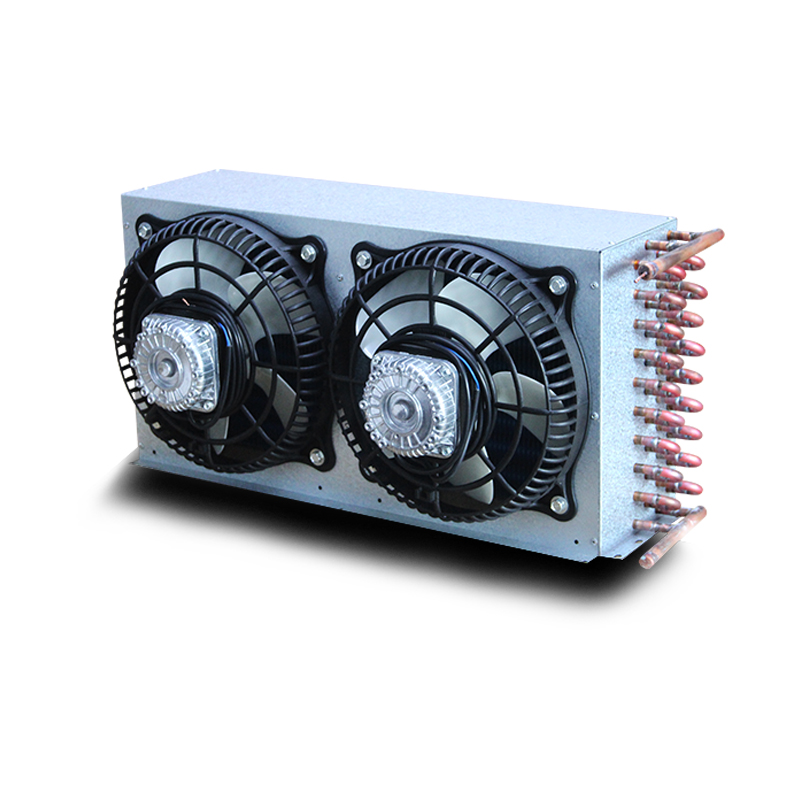1. Introduction
Stainless steel air-cooled condenser is a device that uses air as a medium to cool refrigerant. It is widely used in industrial cooling, air conditioning systems and special environments. It has become an upgraded choice for traditional copper-aluminum condensers with its advantages such as corrosion resistance and high temperature resistance. In modern industry, with the improvement of energy-saving and environmental protection requirements and the complexity of equipment operating environment, the importance of stainless steel air-cooled condensers has become increasingly prominent.
2. What is a Stainless Steel Air Cooled Condenser?
Stainless steel air-cooled condensers are composed of stainless steel finned tubes, fans, motors and frames. When working, the refrigerant flows in the tubes, transferring heat to the surface of the finned tubes. The fan blows air through the fins to take away the heat, realizing the condensation and heat exchange of the refrigerant. Compared with copper condensers, stainless steel can better resist acid and alkali corrosion and high-temperature oxidation, and is suitable for harsh environments.
3. Key Benefits of Stainless Steel Air Cooled Condensers
Strong corrosion resistance: a passivation film is formed on the surface of stainless steel, which effectively prevents salt spray and chemical corrosion, and is particularly suitable for marine and chemical environments.
Excellent high temperature resistance: Stainless steel can withstand high temperatures and is suitable for high temperature condensation conditions.
Long life and low maintenance cost: Not easy to rust or damage, reducing maintenance frequency and cost.
Energy saving and high efficiency: Reasonable design of fins and air ducts to improve heat exchange efficiency and reduce energy consumption.
Light weight and flexible installation: Compact structure, easy to install and repair on site.

4. Applications of Stainless Steel Air Cooled Condensers
Refrigeration and air conditioning systems: Widely used in large shopping malls, office buildings and industrial refrigeration.
Chemical and pharmaceutical industries: Corrosion resistance meets chemical environmental requirements to ensure stable operation of equipment.
Food and beverage processing: Meet hygiene standards to prevent secondary pollution.
Marine and salt spray environment: Ideal choice for ship and offshore platform cooling systems to prevent salt spray erosion.
5. How to Choose the Right Stainless Steel Air Cooled Condenser
Environmental conditions: Consider the surrounding humidity, corrosive media, and temperature range to select the appropriate grade of stainless steel (such as 304, 316, etc.).
Capacity and size: Select the matching condensing area and air volume according to the cooling load and equipment space.
Maintenance requirements: Choose models with reasonable structural design, easy cleaning and maintenance, and reduce the difficulty of later operation and maintenance.
6. Maintenance Tips for Optimal Performance
Regular inspection: Pay attention to whether the fins are clogged with dust and whether the fan motor is operating normally.
Cleaning and maintenance: Use special tools or gas to blow away impurities on the surface of the fins and maintain good ventilation.
Anti-corrosion measures: For special environments, consider applying a protective layer or performing regular surface treatment.
Troubleshooting: Timely detect problems such as refrigerant leakage and abnormal fan noise to avoid affecting system operation.

 English
English عربى
عربى Français
Français русский
русский Español
Español 中文简体
中文简体







